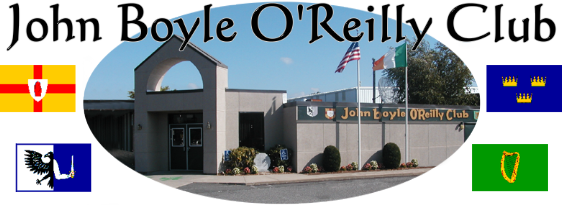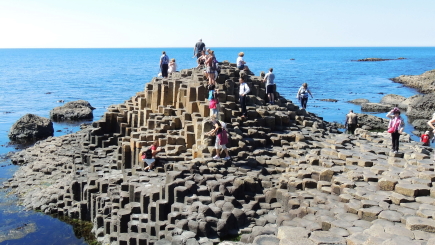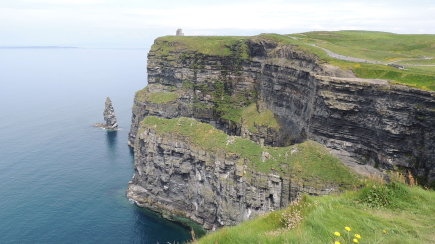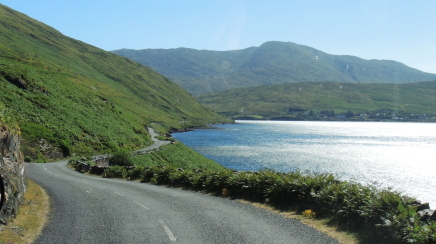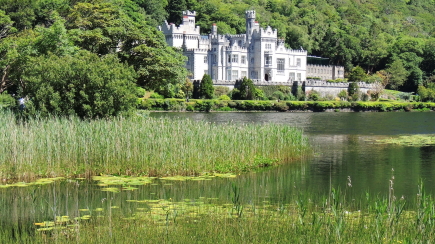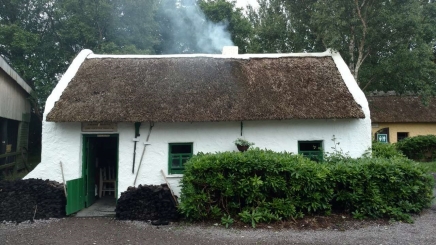John Boyle O'Reilly was born on June 28, 1844, the second of three sons in a family of eight children. His family instilled in him a love of the written word. His father, William, was the headmaster at the Netterville Institution, a National School near Drogheda. His mother, Eliza Boyle O'Reilly, impressed on him a love of poetry and a spirit of rebellion. She was related to Colonel John Allen, who was one of the leaders of the rebellion of 1798 and later won much acclaim as the head of one of Napoleon's legions.
His journalistic career started at the age of nine when he went to work as an apprentice printer for the Drogheda Argus. His salary was 21 pence a week. During this time he read and distributed handbills and other political pamphlets protesting British rule in Ireland. At age 15, the owner of the Argus died and young John Boyle O'Reilly was out of a job. He soon went to England and obtained another newspaper job at the Preston Guardian, starting as an apprentice printer and ending up as a reporter.
When he was 19, his father asked him to return to Ireland. John had become a member of the Fenians, a group dedicated to ending British rule in Ireland by force of arms. He met John Devoy, a leader of the Fenians. He enlisted in the 10th Hussars, the Prince of Wales Regiment. His purpose was to infiltrate the regiment and recruit other Irish members of the regiment to mutiny and fight for Ireland when the signal came. Through his efforts, 80 of the 100 Irishmen in the regiment became Fenians. At that time more than 30 percent of the British military troops were Irish.
The long awaited signal never came. The British Police had raided the offices of The Irish People, a newspaper founded by the Fenian James Stephens. There they arrested Stephens, O'Donovan Rosa, and O'Leary. They also found the files containing the names of the troops whom were Fenians, including the name of John Boyle O'Reilly. Irish Brigades were disbanded or transferred to India.
On June 27, 1866, the day before his 22nd birthday, John Boyle O'Reilly's court martial trial began. The charge read "Having in Dublin, in January 1866, come to the knowledge of an intended mutiny in Her Majesty's Forces in Ireland, and not giving information of said intended mutiny to his commanding officer." Although two government witnesses gave conflicting testimony, John Boyle O'Reilly was convicted of treason and sentenced to death.
His sentence was later commuted due to his young age and finally reduced to 20 years penal servitude. He was chained to other prisoners and brought to Pentonville Prison to work the hard labor of the brickyard. He was then sent to Millbank Prison in London for six months solitary confinement. After some time he was sent to work on the Darthmoor drains, the most notorious prison in England at the time. John Boyle O'Reilly managed to escape in a thick fog but was soon recaptured. He was then sent to Fremantle, Australia on the prison ship "Hougoumont".
In his novel "Moodyne", O'Reilly wrote: "Only those who have stood within the bars and heard the din of devils and the appalling sounds of despair, blended in diapason that made every hatch mouth a vent of hell, can imagine the horrors of the hold of a convict ship."
With his flair for writing, he soon became a friend of the ship's chaplain Fr. Bernard Delany. Fr. Delany gave O'Reilly the materials necessary for the production of a weekly magazine for the ship. The magazine was called the "Wild Goose" after the exiled "Wild Geese" Irish soldiers of the 18th century. The magazine contained many of O'Reilly's early poems. It was here that this poem, "The Flying Dutchman", first appeared:
"They'll never reach their destined port They'll see their homes no more, They who see the Flying Dutchman Never, never reach the shore."
In "Farewell" he wrote of the longing of his fellow prisoners for Ireland:
"Farewell to thy green hills, valleys and plains, my poor blighted country. In exile and chains, Are thy sons doomed to linger."
In January of 1868, John Boyle O'Reilly and his fellow prisoners arrived in Australia to serve out their years of penal servitude. Once again his literary talents and the friendship of a priest were to be used for his advantage. Father Lynch, an Irish Friar, befriended John Boyle O'Reilly and made him the assistant librarian in the prison. He was soon transferred to a convict camp in the Koagulup swamp, a death sentence for many. Before he left, Fr. Lynch told him that a "Fr. Mac" would look in on him at his new work camp.
Father Patrick McCabe did call on O'Reilly. He soon agreed to help him escape to America. Post Civil War America had a fervent anti-British attitude, especially among the Yankee whaling ships. Fr. Mac convinced the captains of two whaling ships, the Gazelle and the Vigilant, to help O'Reilly escape. After narrowly eluding prison guards, O'Reilly made his way to the port of Bunbury and was taken aboard the Gazelle for the trip to America.
O'Reilly arrived in Philadelphia in November of 1869. Fenian groups in New York and Boston greeted him. He secured employment with the Innman Steamship Company but was fired after the company's English owners realized his identity. He also lectured on "England's Political Prisoners" before large audiences at Boston's Music Hall.
John Boyle O'Reilly soon obtained a job more to his liking as a reporter for the Boston Pilot, a paper known as a voice for Irish Americans. His first assignment was to report on the Fenian's attempted invasion of Canada through St. Albens, Vermont in May of 1870. The ineptitude of the Fenian leaders and the disastrous results of the Fenian's armed struggle changed O'Reilly's thoughts on armed revolution. He would later write of obtaining freedom through political means.
After Boston's great fire of 1872 destroyed the offices of the Pilot, the owners sold the paper to the Archbishop Williams of Boston and John Boyle O'Reilly. In agreeing to run the paper, O'Reilly promised the Bishop to run the Pilot "as becomes and Irishman, a Catholic and a Gentleman." When O'Reilly died 14 years later the Bishop commented "He kept his word."
In 1872, John Boyle O'Reilly married Mary Murphy. Mary was also a journalist, writing for the "Young Crusader" under the name of Agnes Smiley. They had four daughters: Mollie, Eliza, Agnes and Blanid.
O'Reilly used the pages of the Pilot to rail against discrimination. He used "free advertisements" by reprinting advertisements that would state "No Irish Need Apply" and expose their sponsors and claiming the ads from those companies meant the Irish trade and commerce were also unwelcome in those stores. O'Reilly was one of the most prominent journalists of his day promoting the rights of Jews, American Indians and Blacks.
John Boyle O'Reilly died in Hull, Massachusetts on August 12, 1890. His death was mourned as the passing of a journalist, orator, patriot, publisher and poet.
John Boyle O'Reilly authored many works including four volumes of poems: "Songs of the Southern Seas", "Songs, Legends, and Ballads", "The Statues in the Block" and "In Bohemia"; a novel, "Moondyne", based on his Australian experiences, and collaborated in another novel, "The King's Men".
